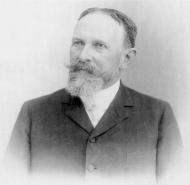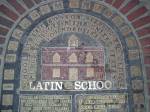The
Boston Latin School is a public exam school founded on April 23, 1635, in Boston, Massachusetts. It is both the first public school and oldest existing school in the United States. The Public Latin School was a bastion for educating the sons of the Boston elite, resulting in the school claiming many prominent Bostonians as alumni. Its curriculum follows that of the 18th century Latin-school movement, which holds the classics to be the basis of an educated mind. Four years of Latin are mandatory for all pupils who enter the school in 7th grade, three years for those who enter in 9th. In 2007 the school was named one of the top twenty high schools in the United States by
U.S. News & World Report. As of 2012, the school is listed under the gold medal list, ranking 62 out of the top 100 high schools in the United States (21,776 public high school from 48 states and the District of Columbia were analyzed) by
U.S. News & World Report. The school was named a 2011 Blue Ribbon School of Excellence, the U.S. Department of Education's highest award.
HistoryThe school's first class was in single figures, but it now has 2,400 pupils drawn from all parts of Boston. It has produced four Harvard presidents, four Massachusetts governors, and five signers of the United States Declaration of Independence. Benjamin Franklin and Louis Farrakhan are among its well-known dropouts.
The school was modeled after Boston Grammar School in Lincolnshire, England, from where many of Boston's original settlers derived. Current students assert with pride that Harvard College, founded a year later in 1636, was created for Boston Latin's first graduates. Whether or not that is true, Boston Latin has been a top feeder school for Harvard, and has consistently sent large numbers of students to Harvard, recently averaging about twenty-five students per year. More than 99% of Boston Latin's approximately 400 annual graduates are accepted by at least one four-year college. Latin School admitted only male students and hired only male teachers from its founding in 1635. The school's first female student was not until the 19th century. Helen Magill White was the school's first female graduate and first American woman to earn a Doctorate. However, soon after White's graduation in 1877, Girls' Latin School was founded. For nearly a century, all qualified female students would attend the all-girls institution. It was not until 1972 that Boston Latin would admit its first co-educational class.
Female teachers predated female students at Latin. In 1967 the school appointed Marie Frisardi Cleary and Juanita Ponte as the first two women in its academic faculty.
Cornelia Kelley, the school's first female Headmaster, served from 1998 to her retirement in 2007, after which Lynne Mooney Teta was selected to become the school's 28th Headmaster. Mooney Teta is a 1986 graduate of Boston Latin, and was formerly an Assistant Headmaster at the school.
AcademicsBoston Latin's motto is
Sumus Primi, Latin for
we are first. This is a double entendre, referring both to the school's date of founding and its academic stature. Boston Latin has a history of pursuing the same standards as elite New England prep schools while adopting the egalitarian attitude of a public school. Academically, the school regularly outperforms public schools in rich Boston suburbs, particularly as measured by the yearly MCAS assessment required of all Massachusetts public schools. In 2006, Brooklyn Latin School was founded in New York City, explicitly modeled on Boston Latin, borrowing much from its traditions and curriculum.
AdmissionsAdmission is determined by a combination of a student's score on the Independent School Entrance Examination (ISEE) and recent grades, and is limited to residents of the city of Boston. Although Boston Latin runs from the 7th through the 12th grade, it only admits students into the 7th and 9th grades. Consequently the higher grades have fewer students than the lower grades, as a relatively large number of students transfer out. The school has historically been described as having a sink-or-swim environment, but in recent years there have been notable efforts to create a more supportive atmosphere.
Because it is a high-performing and well-regarded school in a city school system that is among the worst in the state, Boston Latin has been at the center of controversy concerning its admissions process. Admissions are very competitive, and it is not uncommon for fewer than 20% of applicants to be admitted. Before the 1997 school year, Boston Latin set aside a 35% quota of places in its incoming class for under-represented minorities. The school was forced to drop this policy after a series of lawsuits involving non-minority girls who were not admitted despite ranking higher than admitted minorities. Boston Latin subsequently defeated a legal effort to do away with its admissions process entirely and conduct admissions by blind lottery. Since 1997, the percentage of under-represented minorities at Boston Latin has fallen from 35% to under 19% in 2005, despite efforts by Boston Latin, the Boston Public Schools, and the Boston Latin School Association to recruit more minority applicants and retain more minority students. Some advocate instituting a quota for the number of students that must be admitted from Boston's public middle schools.
Curriculum
Declamation is the most time-honored of the school's traditions. Pupils in the 7th to 10th grade are required to give an oration in their English class three times during the year. There is also Public Declamation, where pupils from all grades, or classes, are welcomed to try out for the chance to declaim a memorized piece in front of an assembly. During Public Declamation, declaimers are scored on aspects such as "Memorization" "Presentation", and "Voice and Delivery", and those who score well in three of the first four public declamations are given the chance to declaim in front of alumni judges for awards in "Prize Declamation".
In addition to the well-known and time-honored tradition of declamation in English classes, recently the Modern Languages department instituted an annual "World Language Declamation" competition. Once a year, during National Foreign Language Week (usually the first week of March),[30] students from grades 8 through 12 perform orations in languages other than English. Most students choose to declaim in the modern language they are studying, though some choose Latin, Greek, or their native tongue. Judges are brought in from various institutions around the city, and mark the students in similar categories to those used in Public Declamation. Entrants are categorized by level, rather than language, such that all students declaiming at the first-year level of various languages are competing against each other, all students at the second-year level compete against each other, and so on. Students who regularly perform exceptionally well at World Language Declamation are honored at Prize Night with the Celia Gordon Malkiel Prize.[31]
In a move that was controversial among some alumni, the school decided in 2001 to decrease the requirement for students' Latin instruction by one year, starting with the class of 2006.[32] The mandatory minimum period of Latin instruction was decreased for students admitted for 7th grade from five years to four years, and for students admitted for 9th grade from four years to three years. This decision was made by the head of the school's Latin department, in recognition of the fact that the requirement was hampering students' ability to take enough courses in important modern subjects such as Physics, Chemistry, Computer Science and modern languages. However, students still retain the ability to study Latin through their sixth year, and many do so, partly in order to maximize the number of AP courses in which they are enrolled.
In a 1789 codicil to his will, Benjamin Franklin established a legacy to fund the Franklin Medals, which are awarded to the school's top-ranking pupils at graduation. The second most prestigious awards, the Dixwell Prizes, are given to pupils excelling in Latin or Greek.
Publications
There are currently two main publications of the Boston Latin School: The Register is the school's literary magazine, and The Argo the school newspaper. George Santayana founded The Register in 1881 to serve as the school newspaper. Over the years, however, it evolved into a purely literary magazine, publishing prose and poetry written by members of the student body, as well as artwork. There are generally two editors-in-chief, and it is published twice per year. The Argo, the school's newspaper, is far younger, having been founded after it was clear that the Register had become a purely literary magazine. As of the 2006–2007 school year, it is published seven times a year. Both the Register and the Argo are entirely student-produced, and both have won awards from the New England Scholastic Press Association.
Another Boston Latin publication is "BLSA Bulletin," published by the Boston Latin School Association, whose president is Peter G. Kelly, '83.
Hall of fame
The Hall of Fame, known casually as "The Wall," refers to the upper frieze in the school's auditorium, where the last names of famous alumni are painted. These names include Adams, Bernstein, Fitzgerald, Franklin, Hancock, Hooper, Kennedy, Mather, Paine, Quincy, Santayana, Winthrop, and many others. The most recent name, Wade H. McCree Jr., was added to the frieze in 1999, and the selection of the name involved a conscious effort to choose a graduate of color. There are no names of female graduates, mostly because females have attended the school for just 34 years and the honor is only bestowed posthumously. Currently there is only space for one more name, and the Head Master enjoys telling incoming students that if they work hard enough, one of their names might end up on "The Wall" some day. There is also a lower frieze with the names of many other distinguished graduates, and a place on the lower frieze can be awarded while the person is still alive.


























